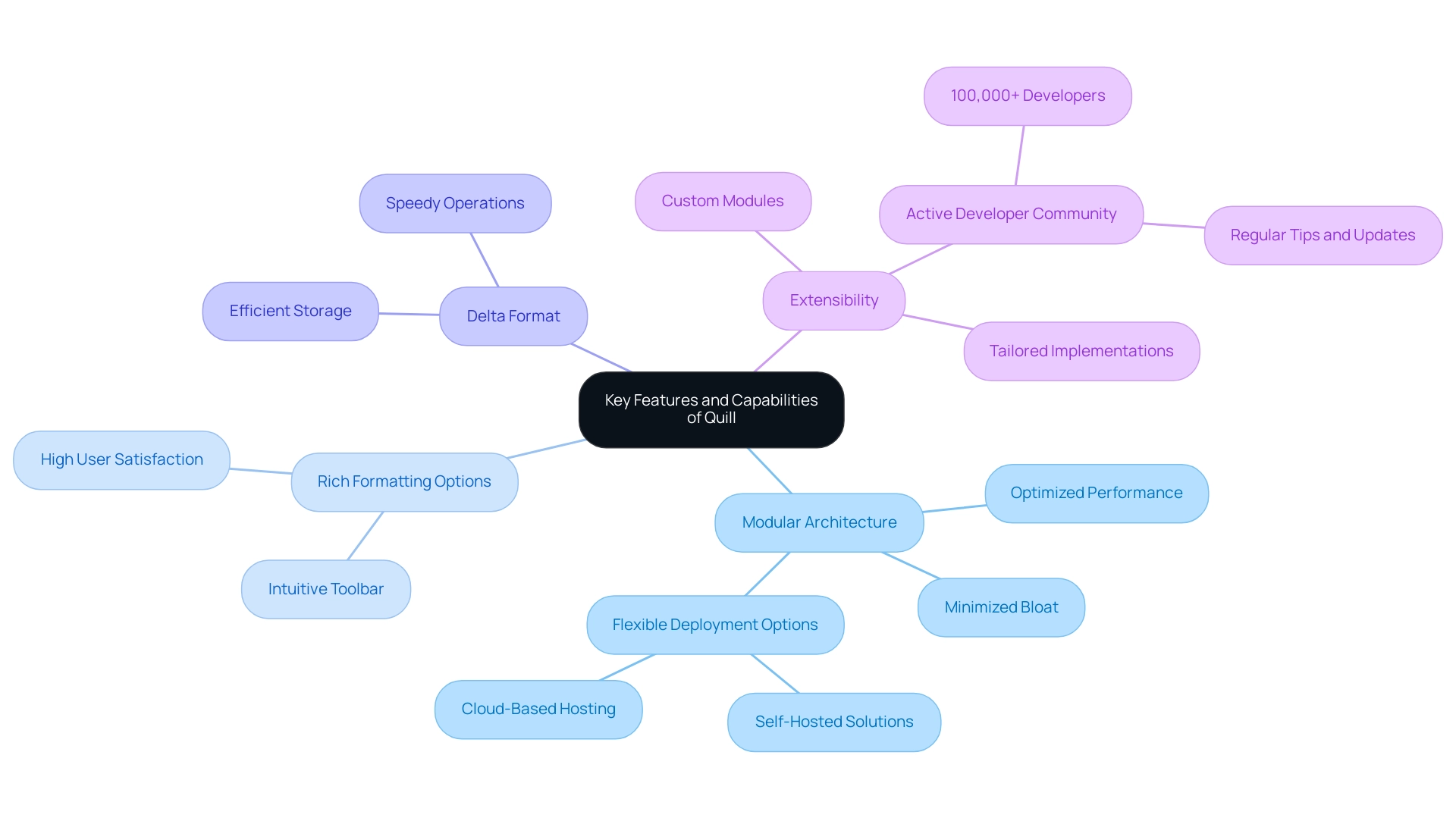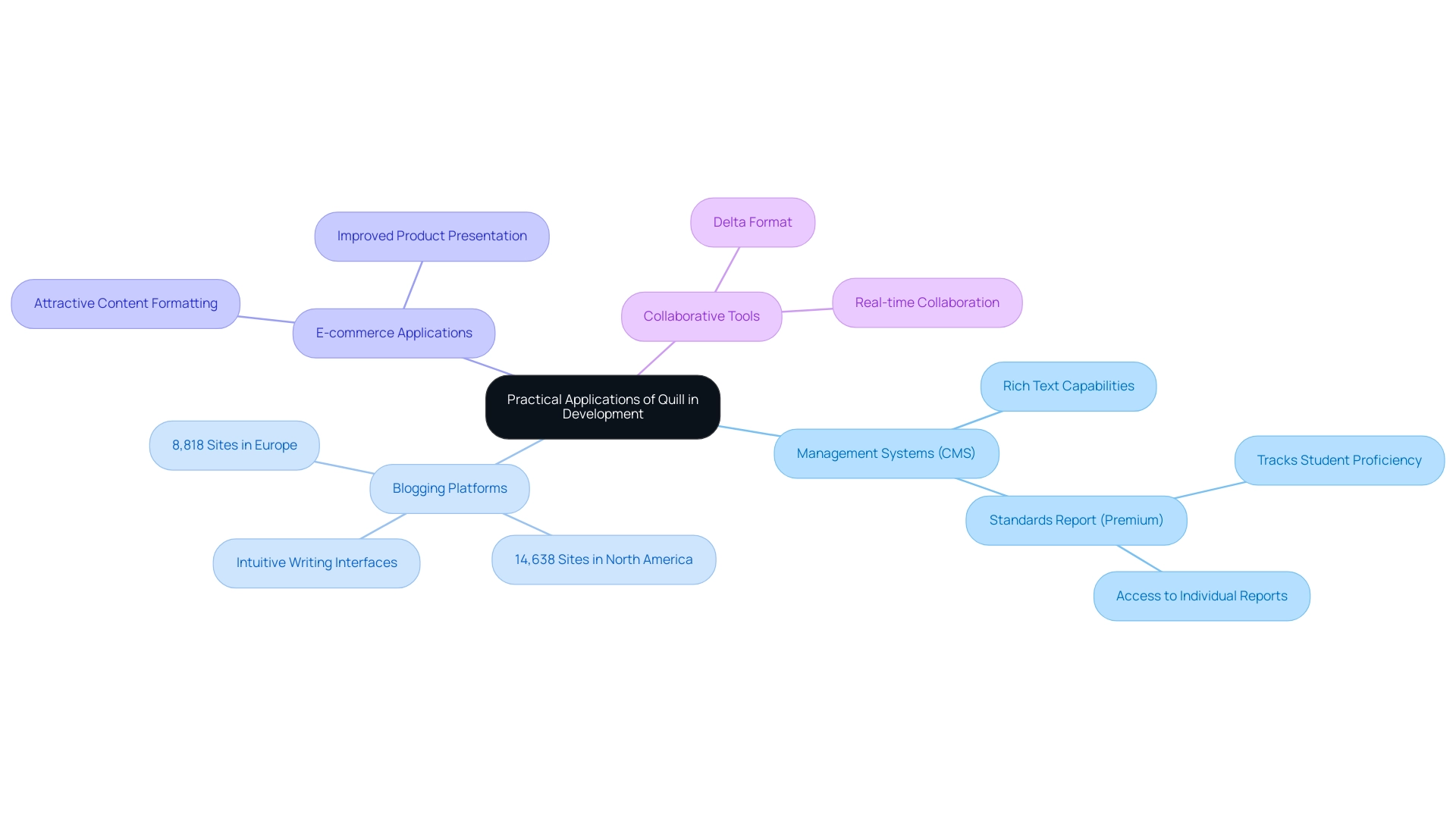Introduction
In the ever-evolving landscape of web development, the demand for efficient and versatile text editing solutions has never been greater. Quill emerges as a leading open-source rich text editor, offering developers a powerful tool to enhance user experiences across various applications.
With its modular architecture, rich formatting options, and unique Delta data model, Quill not only streamlines content creation but also empowers developers to tailor their implementations to meet specific project needs. As organizations strive for greater productivity and adaptability, Quill stands out as a pivotal resource, fostering collaboration and innovation in today’s digital environment.
This article delves into the key features, practical applications, and future enhancements of Quill, illuminating how it continues to shape the way developers approach text editing in web applications.
Introduction to Quill: A Rich Text Editor
The platform stands out as a leading open-source rich content editor, Quill GitHub, designed for programmers who wish to incorporate a powerful and flexible editing solution into their applications. Utilizing contemporary web technologies, this platform provides a streamlined and user-friendly interface that enables the effortless creation, formatting, and manipulation of written content. With 79% of programmers highlighting performance and customizability as vital attributes in rich content editors, Quill GitHub's modular design demonstrates a considerable benefit.
This structure enables developers to personalize and enhance its functionality, making it an ideal choice for various applications, including those that utilize Quill GitHub—from basic input fields to intricate content management systems. As the demand for effective tools continues to grow, this platform, featuring Quill GitHub, remains a pivotal resource for optimizing editing processes in web applications. In a rapidly evolving landscape, mastering time constraints is crucial; as one expert noted, 'Master time constraints in asset due diligence with prioritization, checklists, and delegation.'
Additionally, the recent case study on negotiating for faster deliveries amid supplier shortages highlights how tools like this can streamline processes and enhance efficiency. Staying attuned to the latest news, the continuous updates reflect the growing importance of adaptability and performance in rich content editors, further solidifying its relevance in the market.
Key Features and Capabilities of Quill
This editor stands out in the realm of rich content editors with several key features that significantly enhance its usability and effectiveness:
- Modular Architecture: This design philosophy allows developers to integrate only the necessary components, optimizing performance and minimizing bloat. As a result, the system operates efficiently even in resource-constrained environments. Significantly, this modular method is reflected in TinyMCE's adaptable deployment choices, which also address different security and scalability requirements.
- Rich Formatting Options: With an intuitive toolbar, the editor allows users to effortlessly apply diverse formatting styles such as bold, italic, lists, and links, simplifying the creation process. This ease of use contributes to high user satisfaction ratings among this editor and similar tools.
- Delta Format: This unique data model, known as Delta, captures changes made to content, which facilitates efficient storage and retrieval of rich information. This innovative approach enhances data management and speeds up operations.
- Extensibility: Developers have the flexibility to create custom modules and themes, allowing for tailored implementations that meet specific project needs. This adaptability adds to the popularity of this tool among programmers seeking effective solutions. Join over 100,000 developers who receive regular tips and updates from the Tiny team, further highlighting the active community surrounding these tools.
These features together reinforce the editor's reputation as a powerful and efficient text editing solution for modern web applications. As Coco Poley aptly puts it,
Learn how these features are transforming productivity for teams and why they’re more popular than ever.

The Quill Community and Ecosystem
The tool thrives within a dynamic open-source community dedicated to its ongoing development and refinement. Developers can tap into a rich repository of resources, including comprehensive documentation, detailed tutorials, and active forums where they can seek assistance and exchange insights. GitHub acts as the central hub for collaboration, enabling contributors to report issues, propose new features, and submit code enhancements.
As of March 2024, the engagement within the Quill GitHub community has seen significant growth, reflecting a strong commitment to innovation that keeps Quill GitHub aligned with the latest web technologies and user demands. Significantly, GitHub's traffic shares in March 2024 were:
- 49.09% mobile
- 50.91% desktop
This illustrates the platform's extensive usage among programmers. Additionally, a case study revealed that YouTube was the leading source of social media traffic to GitHub, contributing 54.55% of the share, highlighting the importance of external platforms in driving engagement.
Recent developments, such as the fix to Quill.getText() by @alecgibson, further reinforce the active participation within the Quill GitHub community. This collaborative spirit not only promotes continuous improvement but also creates an environment where developers can effectively share their expertise and contribute to the project. As tx0c aptly noted,
Is there any better alternative for JS which has active development?
This highlights the importance of an engaged community in maintaining robust software solutions.
Practical Applications of Quill in Development
The tool's versatility shines through in a variety of development scenarios, each demonstrating its capacity to enhance user experience and streamline creation processes:
- Management Systems (CMS): With its robust rich text capabilities, the tool stands out as an ideal choice for developing user-friendly editors, allowing for seamless manipulation within CMS platforms. For instance, the Standards Report (Premium) illustrates how educators can track student proficiency in specific standards, showcasing its effectiveness in educational settings.
- Blogging Platforms: Developers harness this tool to craft intuitive writing interfaces tailored for bloggers, significantly enhancing the publishing experience by simplifying formatting and editing tasks. The presence of 14,638 sites in North America and 8,818 sites in Europe utilizing similar tools underscores the relevance of this technology in the industry.
- E-commerce Applications: By integrating this tool into product description fields, sellers benefit from the ability to format their content attractively, thereby improving the presentation of their offerings.
- Collaborative Tools: The Delta format facilitates real-time collaboration on documents, making it a perfect fit for applications dedicated to teamwork and shared content creation.
These applications not only illustrate its adaptability but also highlight its effectiveness in enriching user interactions across diverse domains. As mentioned by Paul Alexandrescu, Technical Director, 'We’re very satisfied with TinyMCE’s features, functionality, ease of integration, and the impeccable support team,' reflecting the high standards and satisfaction among developers using rich text editors.

The Future of Quill: Updates and Enhancements
The future of the platform is set to be transformative, with ongoing enhancements aimed at boosting performance, user experience, and integration capabilities, particularly through the lens of automated code management. Key potential updates include:
- Improved Accessibility Features: Prioritizing usability for all, including individuals with disabilities, is essential for Quill’s evolution. Implementing advanced accessibility functions will ensure compliance and inclusivity, aligning with the increasing demand for accessible web applications. According to recent statistics, over 20% of web users have some form of disability, highlighting the critical need for accessible design in digital tools.
- Integration with Modern Frameworks: As technology progresses, Quill’s ability to adapt to new frameworks will be vital for its continued relevance across diverse tech stacks. This integration will facilitate smoother development processes and enhance overall productivity, particularly through automated code debugging that allows for rapid issue resolution, performance optimization, fixing performance bottlenecks, and ensuring compliance with security best practices.
- Enhanced Collaboration Tools: Future iterations are likely to introduce more sophisticated features for real-time collaboration. As Coco Poley noted, "Real-time collaboration tools like co-authoring and comments are fast becoming essential." With the increasing focus on collaboration in digital content creation, these enhancements will satisfy the requirements of individuals seeking efficient co-authoring and commenting functionalities. Furthermore, automating code reviews and synchronizing API documentation will significantly enhance code quality and security compliance, ensuring that programmers can focus on innovation. Additionally, insights from a case study on preserving the human touch in automated customer service reveal that balancing automation with personalized interactions can significantly enhance user experience. By staying abreast of these developments, developers can optimize their use of Quill, ensuring they leverage its full potential while contributing to its sustained success.
Conclusion
Quill has firmly established itself as a premier open-source rich text editor, offering developers a robust and adaptable solution for enhancing user experiences across various applications. Its modular architecture and rich formatting options not only streamline content creation but also empower developers to customize their implementations to meet specific project requirements. This adaptability is vital in a rapidly evolving digital landscape where efficiency and performance are paramount.
The thriving Quill community further enhances its value, providing a wealth of resources, collaboration opportunities, and ongoing developments that keep the editor aligned with the latest web technologies. Practical applications across diverse domains, from content management systems to e-commerce platforms, showcase Quill's versatility and effectiveness in enriching user interactions.
Looking ahead, Quill is poised for transformative updates that will enhance accessibility, integration with modern frameworks, and collaboration tools. These advancements will not only ensure its continued relevance but also empower developers to optimize their workflows and foster innovation. Embracing Quill means leveraging a powerful tool that not only meets the demands of today but also anticipates the needs of tomorrow's web development landscape.
Discover how Quill can elevate your web development projects—get started today!
Frequently Asked Questions
What is Quill GitHub?
Quill GitHub is an open-source rich content editor designed for programmers, providing a powerful and flexible editing solution for various applications, from basic input fields to complex content management systems.
What are the key features of Quill GitHub?
Key features of Quill GitHub include a modular architecture for optimal performance, rich formatting options for easy content creation, a unique Delta format for efficient data management, and extensibility that allows developers to create custom modules and themes.
How does the modular architecture benefit developers?
The modular architecture allows developers to integrate only the necessary components, optimizing performance and minimizing resource bloat, which is particularly beneficial in resource-constrained environments.
What formatting options does Quill GitHub offer?
Quill GitHub provides an intuitive toolbar that enables users to apply various formatting styles, such as bold, italic, lists, and links, making the content creation process straightforward and enhancing user satisfaction.
What is the Delta format in Quill GitHub?
The Delta format is a unique data model that captures changes made to content, facilitating efficient storage and retrieval of rich information, thereby enhancing data management and speeding up operations.
Can developers customize Quill GitHub for their specific needs?
Yes, developers can create custom modules and themes, allowing for tailored implementations that meet specific project requirements, which adds to the tool's popularity among programmers.
How does Quill GitHub support community engagement?
Quill GitHub has an active community, with over 100,000 developers receiving regular tips and updates from the Tiny team, highlighting the support and resources available for users.
Why is Quill GitHub considered relevant in the market?
Quill GitHub remains relevant due to its continuous updates, adaptability, and performance enhancements, which are crucial in a rapidly evolving landscape of web applications.




